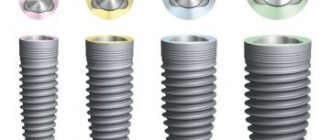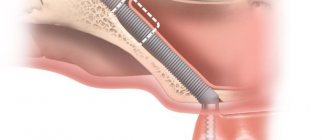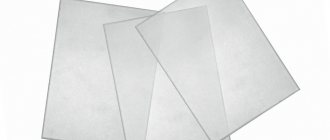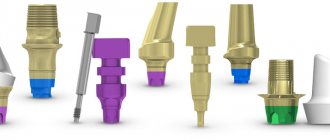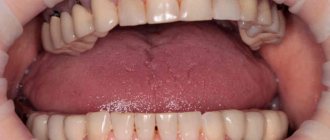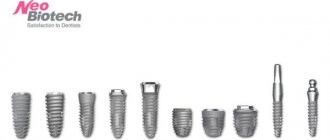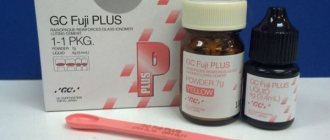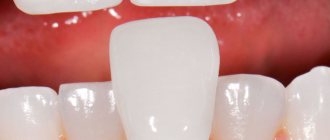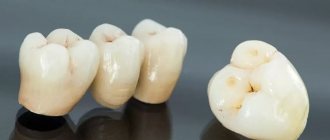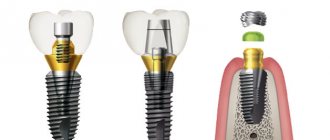2330
To restore the aesthetics and functionality of dental elements, many technologies have been developed, but many of them are not reliable enough or have a decent number of contraindications.
The unique Nobel Procera technology was developed taking into account all the disadvantages of alternative production.
The speed of installation, biocompatibility, and reliability of use of systems created using modern technology make it possible to restore chewing functions even in hopeless patients.
General overview
Nobel Procera technology is a metal-free restoration of the dentition. Modern methods for manufacturing prosthetic products make it possible to produce reliable and high-precision products, taking into account all the individual characteristics of the patient and in compliance with dental standards.
The technology makes it possible to produce fixed dentures in the complete absence of dentition according to the “All on Four” scheme with the introduction of an implant, or veneers, crowns, bridges for the restoration of one or several elements.
The main point of the technology is to use frames that are made using the method of milling block blanks under ultra-precise conditions of the manufacturing plant, using a three-dimensional computer modeling system.
This helps to achieve the best aesthetic and functional results in the manufacture of structures of any configuration.
Peculiarities
Prostheses using this technology are made without the use of metal. The main materials are zirconium dioxide and aluminum. Modern elements are very durable, their service life is more than 20 years. In this case, the thickness of the finished structure does not exceed 0.4 mm.
Such systems are resistant to loads and deformation; they are even fixed to implants.
Zirconium dioxide structures allow achieving high aesthetic results, do not damage the gingival margin and do not cause an allergic reaction.
Due to the high strength of the materials that are necessary to create a prosthesis, it is impossible to form them manually. For this purpose, a CAD/CAM system is used.
It includes three stages:
- oral cavity scanning;
- virtual creation of a prosthesis;
- fabrication of the structure.
The use of x-rays allows you to obtain images in one plane, while computer scanning creates an accurate model of the tooth, taking into account the upper and lower rows.
The results obtained are processed by a computer program, and a virtual prosthesis is created, which is used to reproduce an exact copy using robotic equipment.
Production stages
The first stage is the process of tooth preparation by a doctor to install zirconium crowns. Next, impressions are made of both jaws, at the same stage the shade of the tooth enamel is determined to achieve the identity of the prosthesis.
Impressions are necessary to create an analogue that accurately copies all of the patient’s teeth. They are placed in a device that replicates the function of the temporomandibular joint. The device allows you to achieve optimal aesthetics and design comfort for the patient.
After this, the tooth in need of restoration is identified from the general model. His model is mounted in a Nobel Procera Scanner laser installation, where scanning and creation of a three-dimensional projection takes place.
The specialist makes a computer simulation of a zirconium dioxide cap, which will serve as a frame for the future crown. Digital data in electronic form is given to the manufacturing plant in Sweden for production.
The milling unit consists of a computer-controlled machine and two tips with replaceable cutters, which are directed mutually perpendicularly. Their movement polishes the product and removes excess material.
The finished frame is delivered back to the clinic, where specialists coat it with a specific ceramic mass to improve its aesthetic properties.
Methods of dental prosthetics without grinding and indications for their use.
Come here if you are interested in which crowns for implants are better.
At this address https://www.vash-dentist.ru/protezirovanie/nesemnyie-p/molochnyih.html we will tell you in what cases prosthetics of children's teeth is justified.
Types of Nobel implants used in practice
Nobel Biocare implant systems are well known in the dental implantology market. They are often offered to patients as a worthy solution to various situations, since implantologists consider them to be the best and of the highest quality.
The Nobel brand produces several series of implants that you, as patients, can also encounter in your life. And, by the way, discuss their installation in the clinics of the German Implantology Center.
Branemark System implants
Branemark System
- Nobel's oldest implant system. It has been successfully used since 1965, even before the brand was purchased by the American concern Dentsply. The implants have an external hexagonal connection. There are from 6 to 12 options for fixing the abutment depending on its type, which ensures high-quality prosthetics.
NobelSpeedy Groovy implants
NobelSpeedy Groovy
— this series has implants of different lengths. Used for implantation according to the All-on-4 protocol. They have good survival rate and are suitable for installation with immediate loading. One of the best solutions for the treatment of adentia in patients with severe bone atrophy and loose bone tissue.
NobelZygoma implants
NobelZygoma
— high-quality American implants for implantation into the zygomatic bone without prior osteoplasty. They have high survival rates. But this kind of implantation should always be approached with the greatest caution. And in most cases, today you can always find a worthy alternative to zygomatic implantation from the same classic line of implants.
NobelReplace implants
NobelReplace
— implants of this series can be used both for two-stage implantation and for fixation with immediate loading. Three-channel connection. The implant is compatible with Nobel abutments. Using color coding, it is easy to select the appropriate abutment and accurately fix it in the desired position.
NobelReplace Conical Connection Implants
NobelReplace Conical Connection
- a series of implants with a sealed conical connection. The shape of the implant rod follows the tooth root, so the implant is highly aesthetic. These implants can be implanted into loose bone tissue. They are characterized by high survival rate and primary stabilization.
NobelParallel Conical Connection Implants
NobelParallel Conical Connection
- an excellent universal implantation system from Nobel.
It has high primary stabilization. Implants in this series are suitable for immediate implantation with immediate loading. Due to the aesthetics of Parallel implants, they can be implanted not only in the lateral areas, but also in the smile area
.
NobelActive implants
Nobel Active
— implants of this series are intended for clinically complex cases.
They are suitable for implantation into the hole immediately after removal. Also, implants of this series have proven themselves in the treatment of adentia with bone atrophy. This is one of the best options for implantation with a single-stage load. The rods are fully compatible with all Nobel abutments. The connection is conical. Implants can be used for abutment- or platform-supported prosthetics. Another feature of this series of Nobel Active implants is the narrow cervical zone; they can also be implanted in the smile area
.
ATTENTION!
No matter how excellent Nobel implants are, illiterate installation of implants, premature constant loading with crowns or violation of the patient’s regimen after implantation can nullify all the advantages by causing inflammation in the implantation area - peri-implantitis. This is dangerous and can lead to removal of the implant.
In the following examples you can observe clinical cases of peri-implantitis after installation of the Nobel implant and the cheaper Alfa Bio implant. Please note that in both cases, the installation of implants was carried out in third-party clinics, and patients turned to us after peri-implantitis, as an expert center with a request to provide qualified dental care. Both situations ended with the removal of old implants in the area of inflammation, elimination of inflammation and new implantation on Nobel. Now the patients are doing well.
Advantages
Nobel Procera technology has a number of advantages:
- Maximum adherence to the edge without damaging the gums, thanks to the use of computer modeling.
- Lightweight and durable metal-free system.
- Hypoallergenic, biocompatible, gum color fastness.
- Resistant to temperature and chemicals.
- Aesthetics of the product. It is almost impossible to distinguish a prosthesis from a natural tooth.
- Maximum preservation of dental tissue during grinding.
- Minimum load on the tooth.
Features and advantages of beam prosthetics
Bar prosthetics is a relatively new step in orthopedics. The technology allows you to fasten the beam structure firmly and reliably. The technique practically does not limit the list of permitted foods, and special locks allow you to remove the prosthesis for cleaning and install it yourself afterwards.
Indications for beam prosthetics:
- Loss of several teeth in a row or an entire row of teeth.
- Atrophy of bone tissue, which does not allow implantation of all teeth.
Contraindications to beam prosthetics are similar to contraindications to implantation, since although the technique is minimally invasive, it still requires the installation of a minimum number of artificial roots on which the beam will be attached.
Advantages of beam prosthetics:
- High comfort during operation. You can sleep in a prosthesis; it does not cause any discomfort.
- The chewing load is uniform on the muscles, joints and jawbone, thereby reducing the risk of bone tissue atrophy.
- The design is suitable both for the loss of several teeth in a row, and for the loss of the entire dentition.
- Easy maintenance, ability to remove and install the structure yourself.
- Highly aesthetic and natural: even at close range, the prosthesis cannot be distinguished from ordinary teeth.
- The hypoallergenic alloy of the metal beam does not cause rejection and oxidation.
- Long service life (about 7-8 years).
This type of prosthetics is suitable if the patient’s bone tissue without bone grafting does not allow the implantation of all lost teeth. So, for a prosthesis for 5-7 teeth, it is enough to install only 3-4 implants on which the structure will be attached.
Main differences from conventional crowns
The main difference between Nobel Procera technology and conventional crowns is the absence of metal, which allows you to achieve a 100% natural appearance of the dentition.
The dullness of a regular tooth is achieved due to the presence of enamel and dentin, the transparency of which is not the same. The light refraction in Nobel Procera systems is similar, only instead of natural dental tissue there are two other layers - ceramic enamel and a zirconium dioxide base.
The presence of metal in such structures reduces the reliability of the prosthesis and does not ensure a complete fit to the edge of the gum.
Nobel Parallel Conical Connection Implant System
Implants are universally used; they are used in most clinical cases, regardless of how many teeth need to be replaced. Nobel Parallel CC implants have parallel walls and a cone-shaped apical part, which provides a high level of primary stabilization in bone of any density. The abutment-implant connection is an internal cone with an anti-rotation hexagon.
Contraindications
Contraindications to such prosthetics are pregnancy, acute chronic diseases of the body, bleeding disorders, undergoing radiation therapy, and drug use.
Relative contraindications include inflammation of the oral mucosa and the presence of dental problems, after which, after elimination, such prosthetics can be performed.
What are metal-plastic crowns, their advantages and disadvantages.
This publication contains all the most important things about CBW prosthetics.
Here https://www.vash-dentist.ru/protezirovanie/nesemnyie-p/koronki-np/tselnolityie.html we offer a detailed description of a one-piece crown.
Price
Pricing for prosthetics using Nobel Procera technology varies significantly. This depends on many factors such as:
- Prestige of the clinic.
- Geolocalization of the institution.
- Doctor's professionalism.
- The need for additional manipulations.
The cost of a temporary prosthesis is 6,000 rubles; if it is needed urgently, the price rises to 9,600 rubles, and installation of a permanent structure, taking into account a doctor’s appointment, making impressions and delivery from the factory, can reach 122,000 rubles.
If it is necessary to install one or more implants, the price for installing one unit is 12,000 rubles, and if it is produced by Nobel Biocare - 35,000 rubles.
The video provides additional material on the topic of the article.
Warranty
The use of NobelProcera technology in the production of metal-free orthopedic structures provides high quality and patient comfort when talking, chewing, etc., and minimizes the risk of dental diseases. Dentures and crowns made using this technique provide a flawless smile and self-confidence. If any non-temporary NobelProcera product is damaged, you are guaranteed a free replacement for a period of five (5) years from the date of installation in your mouth. Also, at Ikar dental clinics, you will be provided with free replacement of NobelProcera or Nobel Biocare orthopedic design elements, if this becomes necessary when replacing a damaged NobelProcera product.
Reviews
A healthy smile is the key to success, which is why thousands of people use Nobel Procera technology to restore it.
If you have experience using such structures, we ask you to leave your comments in which you can share your impressions and results of prosthetics.
If you find an error, please select a piece of text and press Ctrl+Enter.
Tags dental crowns fixed dentures
Did you like the article? stay tuned
Previous article
Correction of a gummy smile using gingivectomy
Next article
Let's be honest about the perfection of removable silicone dentures
